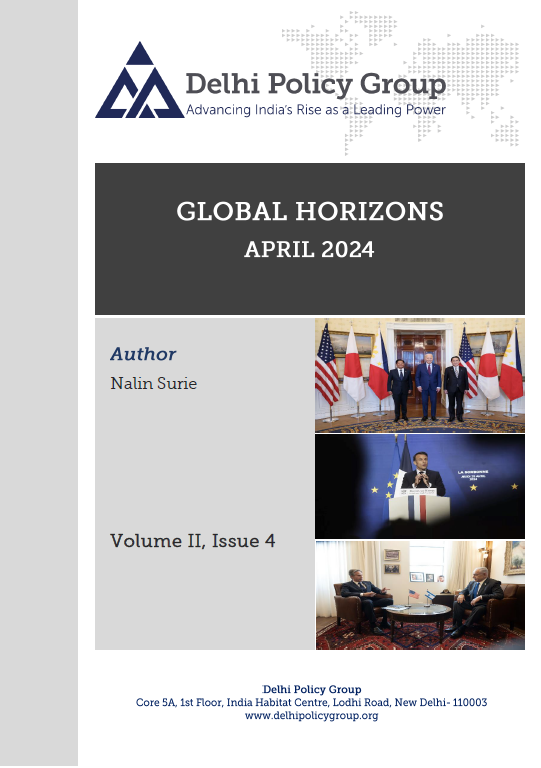Global Horizons
Date: May 03, 2024
April saw US foreign and security policies coming under severe pressure.
In this issue, the author focuses on the multiple challenges faced by the US over the Israel-Hamas war, which have led to the outbreak of anti-Israel student protests at major US universities. The US has also had to ensure that hostilities between Israel and Iran do not escalate into a regional conflict.
Meanwhile, NATO and G7 Foreign Ministers reaffirmed their unwavering support for Ukraine, even as the US Congress finally approved the supply of much-needed military assistance for Kyiv. Despite the high stakes for European security and stability, there are still no manifestations of any peace deal being worked out with Russia.
Important addresses by President Macron of France and EU Council President Michel during the month underlined challenges confronting the EU, from trade and economic issues to defence and security capability. Both leaders, in their own way, called for strengthening of European sovereignty or strategic autonomy.
US-Japan and US-Japan-Philippines summits held in Washington D.C. on April 10 and 11, respectively, reflected an upgraded US strategy to constrain China. While the US and Japan decided to develop a “seamless integration of operations and capabilities” in the area of defence, a joint vision statement issued after the trilateral summit highlighted a shared determination to resist China’s revisionist assertions in East Asia.
A series of high-level dialogues between the US and China, while designed to stabilise bilateral relations, exposed their continuing differences cutting across both security and economic dimensions.
The author concludes that India’s general election, in which some 960 million voters will be eligible to exercise their franchise, is a matter of enormous significance as it showcases the success of pluralist democracy in a fast developing nation, which is also an ancient civilisation.
To read this Global Horizons, Vol. II, Issue 4, please see the PDF attached.
In this issue, the author focuses on the multiple challenges faced by the US over the Israel-Hamas war, which have led to the outbreak of anti-Israel student protests at major US universities. The US has also had to ensure that hostilities between Israel and Iran do not escalate into a regional conflict.
Meanwhile, NATO and G7 Foreign Ministers reaffirmed their unwavering support for Ukraine, even as the US Congress finally approved the supply of much-needed military assistance for Kyiv. Despite the high stakes for European security and stability, there are still no manifestations of any peace deal being worked out with Russia.
Important addresses by President Macron of France and EU Council President Michel during the month underlined challenges confronting the EU, from trade and economic issues to defence and security capability. Both leaders, in their own way, called for strengthening of European sovereignty or strategic autonomy.
US-Japan and US-Japan-Philippines summits held in Washington D.C. on April 10 and 11, respectively, reflected an upgraded US strategy to constrain China. While the US and Japan decided to develop a “seamless integration of operations and capabilities” in the area of defence, a joint vision statement issued after the trilateral summit highlighted a shared determination to resist China’s revisionist assertions in East Asia.
A series of high-level dialogues between the US and China, while designed to stabilise bilateral relations, exposed their continuing differences cutting across both security and economic dimensions.
The author concludes that India’s general election, in which some 960 million voters will be eligible to exercise their franchise, is a matter of enormous significance as it showcases the success of pluralist democracy in a fast developing nation, which is also an ancient civilisation.
To read this Global Horizons, Vol. II, Issue 4, please see the PDF attached.



